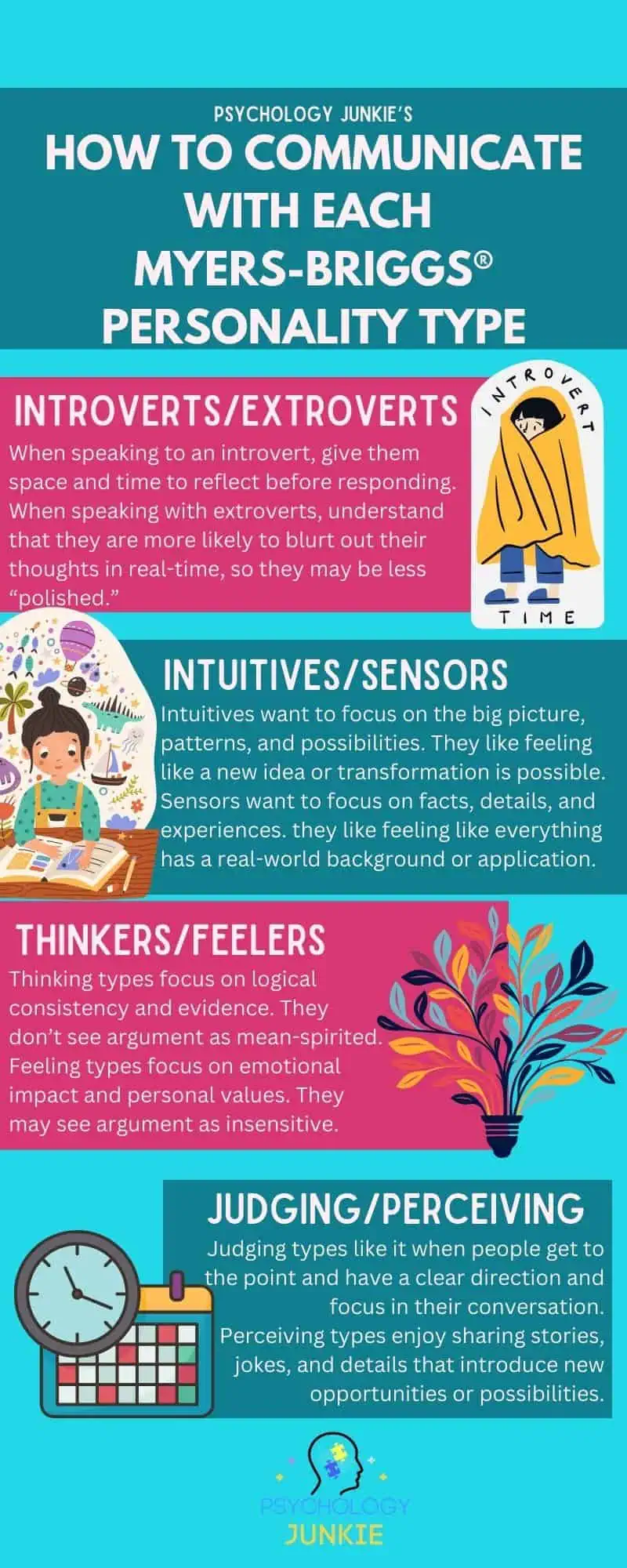How to Communicate Effectively with any Myers-Briggs® Personality Type
Does someone’s Myers-Briggs® personality type affect the way they communicate? Should it make a difference? Should we speak to everyone in the same manner? Today I want to talk about the importance of communication and how different personality types will respond to different modes of communication.
For example, if you’re speaking to an ESTJ and trying to convince them of something, but you’re only using emotional appeals, you’re unlikely to get anywhere. Conversely, if you’re speaking to an ENTP and you’re only using past tradition as a reason to do something, they’ll unlikely be persuaded.

Personality type differences can make communication a struggle or a joy depending on which type you are working with. However, with a few simple guidelines, any type can communicate well with any other type. We just have to know what persuades, motivates, and interests those other people!
Not sure what your personality type is? Take our new personality questionnaire here. Or you can take the official MBTI® here.
How to Communicate Effectively with any Myers-Briggs® Personality Type

Table of contents
- How to Communicate Effectively with any Myers-Briggs® Personality Type
- Communicating with ISTJs
- Communicating with ISFJs
- Communicating with ESTJs
- Communicating with ESFJs
- Communicating with ISTPs
- Communicating with ISFPs
- Communicating with ESTPs
- Communicating with ESFPs
- Communicating with INFJs
- Communicating with INFPs
- Communicating with ENFJs
- Communicating with ENFPs
- Communicating with INTPs
- Communicating with INTJs
- Communicating with ENTPs
- Communicating with ENTJs
Communicating with ISTJs
Do’s: At the beginning of the conversation, make sure you tell your story or present your argument in sequential order. ISTJs want a conversation to go from point A to B to C. Provide verifiable facts and concrete details if you want to win their trust. If you want to interest them, try to show them the practical application of what you’re talking about. How to’s and interesting facts excite them! Theory for theory’s sake often holds little interest. Keep your arguments as logical as possible, and try to simplify your message. Long, meandering tangents can frustrate them.
Don’ts: Don’t jump around from section to section in your story. Intuitives tend to struggle with telling a story in a sequential format, and this is frustrating for ISTJs. Try to keep your communication as linear as possible. Don’t ask them to brainstorm possibilities. ISTJs like time to mull things over and think things through before coming to a decision, so brainstorming and coming up with spontaneous ideas is not enjoyable for them most of the time. Don’t make emotional appeals to get what you want.
Related: All About the ISTJ Personality Type
Communicating with ISFJs
Do’s: At the beginning of the conversation, be clear about the topic you’re wanting to discuss. Be clear about your desires and needs. If you’re giving instructions try to explain them in a step-by-step format. To gain their interest, talk about the practical application of your message or how your idea or position may positively impact people. Be polite, conscientious, and considerate. Good manners and respect for the ISFJ’s privacy is a must. Respect their feelings and show consideration for the feelings of other people that you are discussing. Honor your promises, commitments, and plans.
Don’ts: Don’t ask invasive personal questions unless you have an extremely close friendship already. Let them take the lead in this area. ISFJs are very private people and will feel uncomfortable if you are pushing too deeply into their personal affairs. Don’t rush them to make a decision; these types need time to think things over and analyze situations. Present a calm, supportive demeanor; never raise your voice or disregard their emotions and feelings. These are gentle, empathetic individuals and they desire patience and empathy in return.
Related: 10 Things You Should Never Say to an ISFJ
Communicating with ESTJs
Do’s: At the beginning of the conversation, be clear and direct about your message. Speak in a sequential order and get “straight to the point” while backing up your plan with facts and concrete details. Be frank and confident and expect the same in return. To win their trust, make sure you show that you are responsible and have plenty of empirical logic behind your message. To influence them, try to appeal to their love of justice and fairness and show that you know how to “get the job done.” Show that you respect the rules and aren’t wishy-washy.
Don’ts: Don’t appeal to them on an emotional level. They tend to distrust emotions, especially in early/mid-life. As they get older their inferior function (Introverted Feeling) will be more developed and they may place more trust in emotional/value-based decisions. Don’t skirt around troublesome issues or details, be clear and honest about everything. Don’t “beat around the bush,” this irks them to no end.
Related: Understanding ESTJ Thinking
Communicating with ESFJs
Do’s: At the beginning of the conversation, be clear yet considerate about your message. Show your concern for the people involved and for the feelings of the ESFJ. If you’re discussing a plan, try to speak in a sequential order and provide facts and details for credibility. To win their trust, be honest and polite and explain how you feel about what you’re saying. To persuade them, show how your message correlates with their value system or positively impacts people. Mention points of agreement and positives before giving criticism. As always with SJ types, practical application is important.
Don’ts: Don’t disregard their feelings, values, or emotions. Their values are just as real to them as any facts and are just as important. Do not accuse them of being irrational if they become emotional. Don’t belittle their value system or their feelings. Try not to cut them off when they’re speaking. And as always with Sensing types, avoid being random while talking, try to keep your message clear and linear.
Related: 10 Stress-Busting Tips for ESFJs
Communicating with ISTPs
Do’s: At the beginning of the conversation, state clearly what your message is about. Be straightforward, concise, and realistic. To gain their trust, show that there’s a practical, immediate application for what you’re talking about and that you have a logical rationale behind what you’re saying. To generate interest, appeal to their desire for action and sensory exploration. Use hands-on demonstrations if it’s applicable. Keep your message simple and to-the-point. Listen carefully to what they have to say and respect their privacy.
Don’ts: Don’t overschedule their time or drone on for hours. Try to be concise and direct. Don’t ask invasive personal questions. They are very private people and will initiate that kind of conversation when they’re ready. Try to avoid making emotional appeals or using emotions to manipulate them. This will instantly turn them off. Don’t talk over them. ISTPs are not very talkative, and they choose their words carefully. If you talk over them you may miss an extremely important message they’re trying to communicate.
Related: Understand ISTP Thinking
Communicating with ISFPs
Do’s: At the beginning of the conversation, be clear and friendly in what you are trying to convey. To win the ISFP’s trust, show that you’ve thought through what you’re saying and that you’ve considered their personal experience and values. Be honest! ISFPs are excellent at spotting phoniness or hidden agendas. To generate interest, show how your message will benefit others in a practical way. Try to ask their opinions and feedback. Appeal to their fun-loving, sensory side by explaining real, tangible details and enjoyments.
Don’ts: Don’t invade their privacy. ISFPs are very private individuals and will not feel comfortable with highly invasive questions unless they know you very well. Don’t push them into social engagements or public speaking as this can be very stressful for them. Keep your voice calm and refrain from yelling or getting physically overbearing. Do not put down their emotions, values, or sensitivity. Don’t expect an immediate reaction or answer to what you’re suggesting, and give them plenty of time to think things over.
Related: 10 Surprising Truths About ISFPs
Communicating with ESTPs
Do’s: At the beginning of the conversation, be straightforward, clear and friendly in what you’re trying to say. Get straight to the point and provide proof and evidence to support your claims. Keep your message simple, but provide plenty of options if they need them. To persuade an ESTP, focus on practical application or enjoyment. ESTPs enjoy an element of risk, so appeal to their ability to take smart, calculated chances.
Don’ts: Don’t talk down to them or underestimate their logical mindset. ESTPs introvert their analytical thinking side and so more extraverted thinking types can make incorrect assumptions about their ability to understand complexities. Don’t impose on their time and expect them to instantly conform to your agenda. Don’t take yourself too seriously. ESTPs can take you seriously while still maintaining a light-hearted, witty demeanor. Don’t take their friendly banter and casual ribbing as a sign of disinterest or condescension.
Related: The Top 7 Gift Ideas for ESTPs
Communicating with ESFPs
Do’s: At the beginning of the conversation, be direct and focused on what you are trying to say. Try to prioritize what is realistic and practical and lay things out in a sequential order. Be polite and conscientious and show appreciation for their viewpoints and ideas. To gain an ESFPs trust, be friendly and authentic; they are quick to spot phoniness. To persuade an ESFP, explain how your message will benefit others or has a practical application. Show them how your idea might provide sensory enjoyment if applicable.
Don’ts: Don’t take yourself too seriously. ESFPs are friendly and casual and prefer to be around people of the same. Don’t invade their privacy. Even though the ESFP is usually outgoing, they can be very private about their personal lives. Don’t try to theorize extensively on the future, ESFPs are people of the moment and can be stressed by having to project far off into the future. Try to get to the point and avoid beating around the bush; if you have something to say, say it. This doesn’t mean they aren’t interested in your stories; but try not to ramble about irrelevant data. Don’t push them to make a decision before they are ready; give them time to think things through.
Related: 10 Things You Should Never Say to an ESFP
Communicating with INFJs
Do’s: When speaking with an INFJ, focus on your vision or goal for the future. INFJs are big-picture people and they will want to know how your message fits into a larger personal or global plan. Ask for their ideas, their insight into people, or creative solutions and possibilities. To gain an INFJ’s trust, be conscientious and honest; they are quick to spot hidden motives or deceit. To persuade an INFJ, focus on how your message will benefit humanity in some way. Be ready to analyze, plan, and strategize. They may play the devil’s advocate if you are completely set on one viewpoint.
Don’ts: Don’t rush them to come up with a conclusion; instead, give them time to analyze and think things over. Approach conversations with an open mind and realize that they hunger for depth more than casual chit-chat. Don’t dismiss their abstract, theoretical approach. INFJs tend to think in symbols and metaphors and understand life in a similar way. It can be difficult for them to express their viewpoint in a straightforward, sequential format. Don’t patronize them if you don’t understand them, this will never go well.
Related: 10 Things You Should Never Say to an INFJ
Communicating with INFPs
Do’s: When speaking with an INFP, the most important thing to remember is to be conscientious and honest. INFPs instantly spot dishonesty, and they are very sensitive to criticism or harsh words. Give them time to think through what you’re saying and consider the future implications of your ideas. To gain an INFPs trust, you must be sincere in what you say. To persuade an INFP, focus on how your message will benefit others or how your message provides creative opportunities. If you really want to make an impact, learn about the INFP’s passions and find links between your message and their passion.
Don’ts: Don’t dismiss their feelings or values, these are extremely personal and important to them and dismissing them could cause irreparable harm to your relationship. Avoid rushing them to make a decision; give them plenty of time to mull things over and think of alternatives. Don’t be married to one specific rule or plan; INFPs like to modify and change plans after reflection and consideration. When the INFP is trying to convey a point, don’t talk over them or interrupt. Truly listen. INFPs are some of the very best listeners, and they rarely find people who listen as well as they do. If you can truly listen to them you will have a much better chance of being trusted.
Related: 10 Things You Should Never Say to an INFP
Communicating with ENFJs
Do’s: When speaking with an ENFJ, focus on the big picture and how your message will positively impact humanity. Ask for their ideas and insight into the people involved or what an ideal plan would be. Show compassion and kindness in your words. Be sincere, focused, and show that you care about them by maintaining eye contact. If giving criticism, make sure to start by pointing out areas where you appreciate them first. Let them know that the criticism isn’t meant to harm or hurt their feelings.
Don’ts: Never dismiss their feelings or values or try to talk them out of anything that has been laid on their conscience. Don’t rush them along or cut them off; the ENFJ likes to talk things out and will feel frustrated if someone hurries them along too much. Consider how you talk about other people; avoid gossiping or badmouthing. Healthy ENFJs will be turned off by people who are backstabbing and “pot stirring.” Don’t focus too extensively on a lot of small details; ENFJs care less for this than they do for the big picture or personal side of what you are saying. They’ll ask for details if they need them.
Related: 10 Things You Should Never Say to an ENFJ
Communicating with ENFPs
Do’s: When speaking with an ENFP, it’s important to be open-minded and willing to brainstorm. ENFPs see numerous possibilities everywhere and love to discuss them with others. To gain their trust, be honest and unprejudiced. ENFPs are quick to spot phoniness and hate anything that isn’t 100% sincere. To gain their interest, focus on the future and theoretical possibilities. Present lots of options and focus on potential. Keep them involved and have interactive communication. Listen.
Don’ts: Don’t limit the ENFP. They are masters of brainstorming and idea-generating and will feel instantly rebuffed if you have a rigid mindset. Don’t focus on numerous concrete details, this will frustrate them. They will ask for details if they need them. Instead, they prefer to focus on the big picture. Don’t shut down their possibility-focused mind; try to keep yourself open to what they’re considering. Don’t be too uptight or formal, try to keep things casual and friendly. If you’re interested in their personal life, avoid getting too nosy or prying. They keep their emotions relatively private except with close friends and find a lot of invasive interrogating overwhelming and meddling.
Related: 10 Things You Should Never Say to an ENFP
Communicating with INTPs
Do’s: When speaking with an INTP, it’s important to be logical and open-minded. INTPs like to analyze and consider many possibilities and angles, and they need time to think things through before giving an answer. Try to be creative and unprejudiced when speaking with the INTP; don’t throw a lot of rigid rules and expectations at them. To gain their trust, be as reasonable and honest as possible. To gain their interest, give them a puzzle or intellectual challenge to solve. They enjoy brain-teasers and complexities. Show appreciation for their creative problem-solving skills.
Don’ts: Don’t make them conform to rigid rules or the “tried-and-true” technique. As intuitives, they are more likely to see innovative pathways than rely on past techniques. Don’t rush them to make a decision; they like to have time to mull things over. Avoid getting overly emotional or confrontational; try to stay calm and steady when discussing disagreements. INTPs are often overwhelmed by strong emotions and can struggle to know how to respond. Don’t invade their privacy; this tends to rattle them and make them feel frustrated and stressed.
Related: 10 Things You Should Never Say to an INTP
Communicating with INTJs
Do’s: When speaking with an INTJ, it’s important to be logical and focused on the big picture. Show them how your message fits into a larger future vision or framework. Give them time to absorb your ideas and input before having a long discussion. Focus on strategy, planning, and logic. To gain their trust, be authentic, respectful, and calm. To gain their interest, give them a complex problem to solve or ask them for long-range strategies. Show appreciation for their insight and analytical skills.
Don’ts: Don’t overwhelm them with a bunch of concrete details. They will ask for details if necessary, but they will first want to see the big picture. Don’t belittle their visionary, out-of-the-box ideas. Instead, be willing to open your mind to new possibilities that haven’t been explored before. Don’t rigidly stick to the “tried-and-true” technique, and be prepared for them to play devil’s advocate. If you want to persuade them of something, don’t rely on emotional appeals; this will only make them feel manipulated. When they are direct about their thoughts, try not to imbue negative intent onto what they’re saying. They think bluntness is respectful because it is honest and efficient. When an INTJ is blunt it doesn’t mean they don’t care, are being insensitive, or intentionally hurtful. Let them know if they said something that hurts your feelings, but be open to the possibility that they had no intention of being hurtful.
Related: 10 Things You Should Never Say to an INTJ
Communicating with ENTPs
Do’s: When speaking with an ENTP, it’s important to be open-minded, attentive, and ready to brainstorm. To gain their trust, be unprejudiced, analytical, and logical. To gain their interest, discuss new/ingenious/novel ideas and theoretical possibilities. Give them time to think things through and discuss alternatives. Give them lots of options and inspirations for a future outcome. Make sure your opinions are well researched and logical. Be open to friendly debate.
Don’ts: Don’t stifle their brainstorming or make them conform to rigid rules. If the line “if it ain’t broke don’t fix it” is in your vocabulary, you may want to toss it aside while talking to an ENTP. Don’t overwhelm them with a multitude of concrete details; let them ask for more details if they need them. Instead, focus on the big picture. Don’t make snap judgments or decisions without researching them. If you want to persuade them of something, avoid using emotional appeals as this will only seem manipulative to them.
Related: 10 Surprising Truths About ENTPs
Communicating with ENTJs
Do’s: When speaking with an ENTJ, it’s important to be confident, direct, and logical. Get to the point and don’t waste time with a lot of extraneous details. To gain their trust, make sure your opinions are researched and well-thought-out. Be honest. To gain their interest, show how your message fits into the big picture or is innovative. Show that you are a hard-worker that believes in your message.
Don’ts: Don’t beat around the bush or give a bunch of side-notes. Be direct and on-point. Don’t be wishy-washy or apologetic. Avoid making emotional appeals to get your point across; this will turn them off more than persuade them. Be direct about what you want and avoid wasting time with social niceties and excessive tactfulness. Don’t “suck up” to them or try to win them over with flattery. Don’t make uninformed judgments.
Related: 10 Things You Should Never Say to an ENTJ
What Do You Think? Do you have any communication tips and tricks? Share them in the comments!
Find out more about your personality type in our eBooks, Discovering You: Unlocking the Power of Personality Type or The INFJ – Understanding the Mystic. You can also connect with me via Facebook, Instagram, or Twitter!

This article contains affiliate links.












It seems that a lot of the world’s problems stem from miscommunication, or lack of communication – which in turn is the product of 1) people not knowing how to say what they mean, and/or 2) people not knowing how to listen. As an INTP I want to reconcile conflicting “facts,” and some take this as argument rather than a request for understanding. I also tend to over-explain and provide too much information (for some) to avoid misunderstanding. Otherwise I seem to have a blend of the contrasting traits described. If someone is accusing me using broad generalizations (“You always…”) I would expect specific examples even being an Intuitive. As a Thinker I can appreciate a reasoned discussion but don’t enjoy arguing; how the other person comes off depends on his/her demeanor and willingness to consider what I have to say.
Most of the workplace conflicts I’ve observed or been part of have been with (immature?) ENTJs, and I can attest to the recommendations here. Argue with facts, not opinions. Be sure of your facts and don’t fudge them to suit your argument or make yourself look better (as they will know and call you out). Don’t be mousy or beat around the bush (as this just provokes impatience). Don’t make excuses (or say anything that can be construed as an excuse). And don’t try to ingratiate. All of this said, communication requires two willing participants, and this can’t happen if one of them just wants to be “right” and move on. It also seems to me that some communication styles are polar opposites and that some types need to just minimize interaction with certain other types as misunderstanding and conflict are inevitable.
Brilliant. Thank you, Susan. I appreciate what you do hear and read every email. 🙂 ISFJ